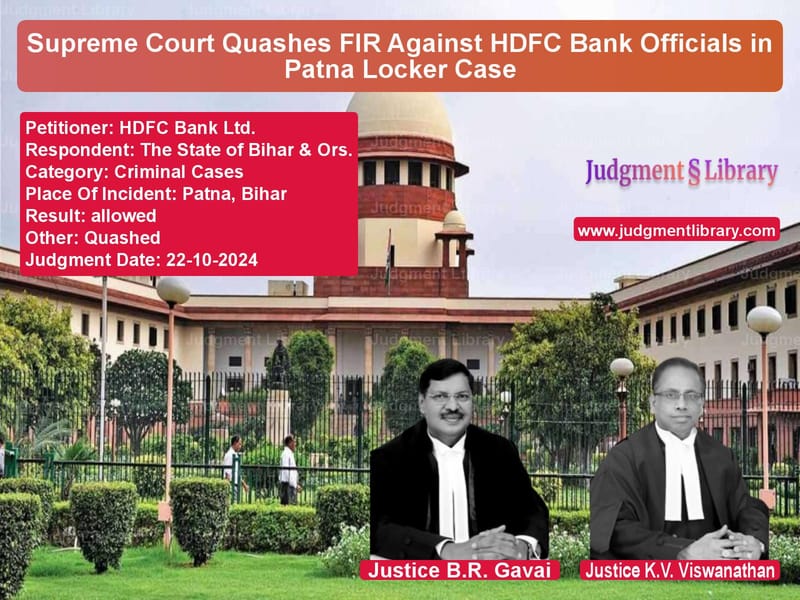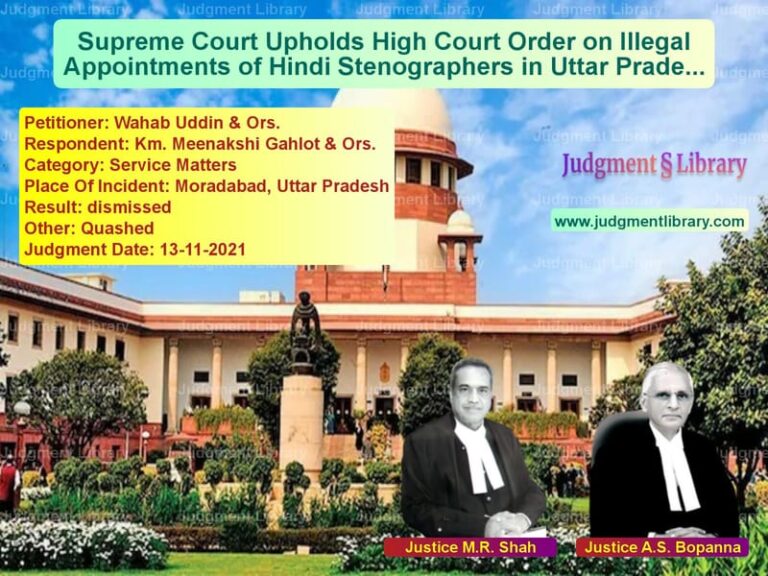Supreme Court Quashes FIR Against HDFC Bank Officials in Patna Locker Case
The Supreme Court of India, in the case of HDFC Bank Ltd. v. The State of Bihar & Ors., delivered a crucial judgment on October 22, 2024, quashing an FIR registered against officials of HDFC Bank’s Exhibition Road Branch, Patna. The FIR had been filed under multiple sections of the Indian Penal Code (IPC) alleging that the bank officials facilitated the unlawful operation of a seized bank locker. The Supreme Court ruled that the FIR did not disclose any prima facie case against the bank or its officials and that continuing the criminal proceedings would cause undue hardship.
Background of the Case
The case stemmed from an Income Tax (IT) search and seizure operation conducted in October 2021 against multiple income-tax assessees, including Smt. Sunita Khemka. During the search, it was found that Sunita Khemka held a bank locker (No. 462) in HDFC Bank’s Exhibition Road Branch, Patna. On October 5, 2021, the Deputy Director of Income Tax (Investigation), Priyanka Sharma, issued an order under Section 132(3) of the Income Tax Act, 1961, restraining the operation of all bank accounts, lockers, and fixed deposits of the concerned individuals.
Key Events Leading to the FIR
- On November 1, 2021, the Income Tax Department issued a revocation order lifting the restraint on certain bank accounts, including those of Sunita Khemka.
- On November 2, 2021, an email containing the revocation order was sent to HDFC Bank’s branch manager.
- On November 9, 2021, Sunita Khemka operated bank locker No. 462 after allegedly being informed by the bank that the restriction had been lifted.
- On November 20, 2021, the Income Tax Department conducted another search and found that Sunita Khemka had accessed her locker.
- On November 22, 2021, the department lodged an FIR against the bank officials under Sections 34, 37, 120B, 201, 206, 217, 406, 409, 420, and 462 of the IPC.
Petitioner’s Arguments (HDFC Bank Ltd.)
The appellant-bank, represented by Senior Advocate Neeraj Kishan Kaul, argued:
- The FIR failed to disclose any mens rea (criminal intent) or conspiracy by the bank officials.
- The bank officials had misinterpreted the revocation order, believing that it applied to lockers as well as accounts.
- There was no collusion between the bank officials and Sunita Khemka.
- The bank was a juristic entity and could not possess criminal intent.
- The charges under Sections 406, 409, and 420 IPC, which deal with criminal breach of trust and cheating, were not applicable.
Respondent’s Arguments (State of Bihar & Income Tax Department)
The State of Bihar and the Income Tax Department contended:
- The bank officials willfully ignored the October 5, 2021 restraint order.
- Sunita Khemka was aiding by the bank in breaching the order under Section 132(3) of the IT Act.
- Section 409 IPC (criminal breach of trust by a banker) was applicable because the bank had a duty to enforce the restraint order.
- The matter required an investigation and could not be quashed at the FIR stage.
Supreme Court’s Analysis and Judgment
Failure to Establish Mens Rea
The Supreme Court ruled that the allegations did not disclose any criminal intent on the part of HDFC Bank or its officials:
“The FIR does not show that the appellant-bank had induced anyone fraudulently or dishonestly to deliver any property, nor does it establish any mens rea.”
No Criminal Breach of Trust
The Court examined the charge of criminal breach of trust under Sections 406 and 409 IPC and found it inapplicable:
“Entrustment of property is a prerequisite for criminal breach of trust. The appellant-bank was merely implementing the orders of the Income Tax Department and had no dominion over the locker contents.”
Improper Invocation of Section 420 IPC
The Court held that Section 420 IPC (cheating and dishonestly inducing delivery of property) did not apply:
“For an offense under Section 420 IPC, there must be inducement, deception, and dishonest intent at the outset. The FIR does not make out these elements.”
Role of the High Court
The Supreme Court criticized the Patna High Court for failing to apply the principles laid down in State of Haryana v. Bhajan Lal and Arnab Goswami v. State of Maharashtra:
“The High Court erred in dismissing the writ petition without assessing whether the FIR prima facie made out a case.”
Key Takeaways from the Judgment
- Criminal liability requires clear intent: Mere procedural lapses without criminal intent do not attract IPC offenses.
- Banks must exercise due diligence: However, unintentional errors should not lead to criminal prosecution.
- Protection from frivolous FIRs: The ruling prevents banks from being unfairly targeted for procedural misinterpretations.
Impact of the Judgment
- Ensures judicial oversight: Reinforces the power of courts to quash frivolous criminal cases at the FIR stage.
- Guidelines for financial institutions: Sets a precedent on the scope of liability for bank officials in cases of tax-related restraints.
- Limits misuse of criminal law: Prevents wrongful prosecution of professionals for procedural errors.
Conclusion
The Supreme Court’s ruling in HDFC Bank Ltd. v. State of Bihar ensures that banks and their officials are not subjected to baseless criminal proceedings for errors arising from misinterpretation of official orders. The judgment reinforces that criminal intent is essential for prosecution under IPC and protects financial institutions from unwarranted litigation. This decision will serve as an important precedent for banks, tax authorities, and corporate professionals handling regulatory compliance.
Petitioner Name: HDFC Bank Ltd..Respondent Name: The State of Bihar & Ors..Judgment By: Justice B.R. Gavai, Justice K.V. Viswanathan.Place Of Incident: Patna, Bihar.Judgment Date: 22-10-2024.
Don’t miss out on the full details! Download the complete judgment in PDF format below and gain valuable insights instantly!
Download Judgment: hdfc-bank-ltd.-vs-the-state-of-bihar-&-supreme-court-of-india-judgment-dated-22-10-2024.pdf
Directly Download Judgment: Directly download this Judgment
See all petitions in Fraud and Forgery
See all petitions in Corporate Compliance
See all petitions in Banking Regulations
See all petitions in Money Laundering Cases
See all petitions in Legal Malpractice
See all petitions in Judgment by B R Gavai
See all petitions in Judgment by K.V. Viswanathan
See all petitions in allowed
See all petitions in Quashed
See all petitions in supreme court of India judgments October 2024
See all petitions in 2024 judgments
See all posts in Criminal Cases Category
See all allowed petitions in Criminal Cases Category
See all Dismissed petitions in Criminal Cases Category
See all partially allowed petitions in Criminal Cases Category







